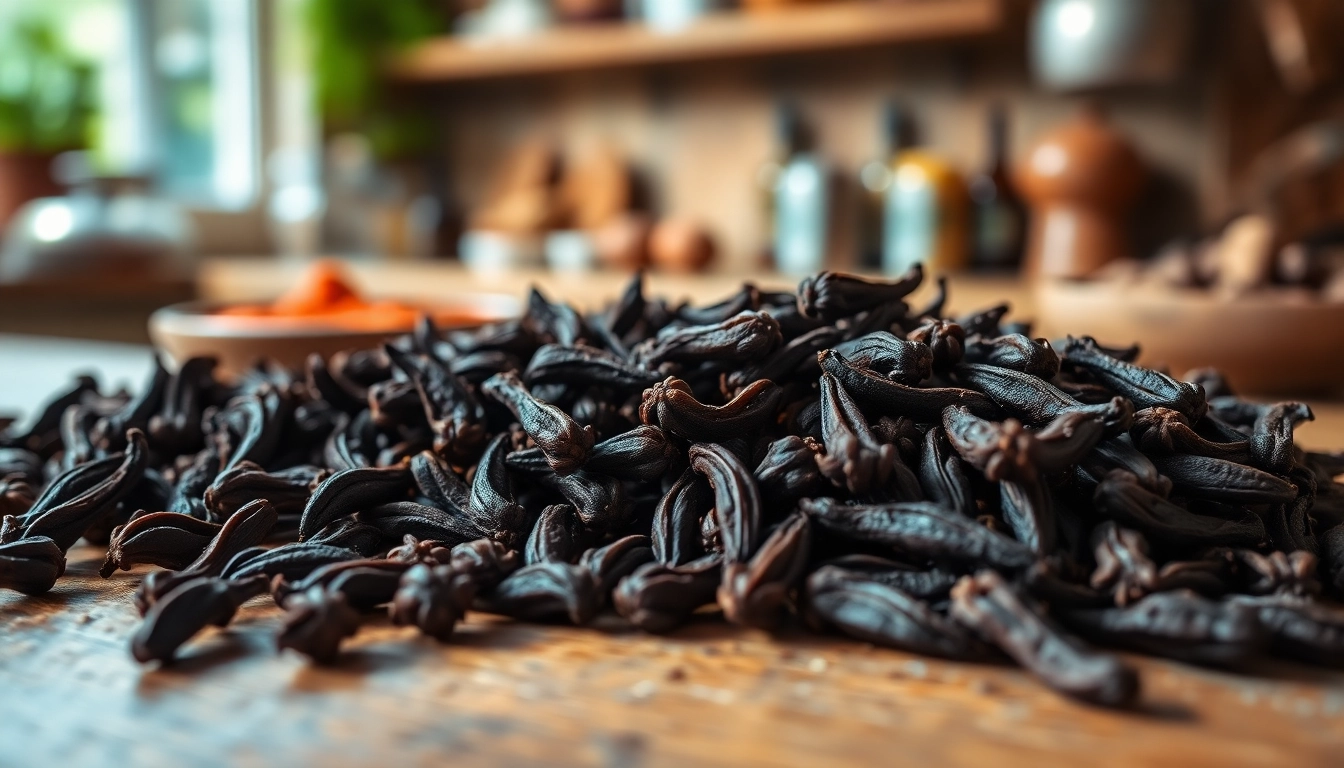Introduction to Cloves
Cloves, scientifically known as Syzygium aromaticum, are the aromatic flower buds of a tree that belongs to the Myrtaceae family. Native to the Maluku Islands in Indonesia, cloves have gained international recognition for their unique flavors and medicinal properties. Used widely in both culinary and therapeutic applications, they have become staples in kitchens and apothecaries around the world. Their distinct flavor profile and numerous health benefits have made them a subject of fascination among cooks, herbalists, and health enthusiasts alike. Understanding the rich history, variety, uses, and nutritional benefits of cloves can enhance our appreciation of this treasured spice.
What Are Cloves?
Cloves are small, dried flower buds that resemble tiny nails or buds. They possess a warm, sweet, and slightly bitter flavor, and are known for their potent aroma. The eugenol in cloves is responsible for their distinct flavor and is often used in perfumes, cosmetics, and food products. In culinary contexts, cloves are typically used as whole buds or ground into a powder. Their versatile nature allows them to be incorporated in savory dishes, sweet desserts, and even beverages, making them a valuable addition to any culinary repertoire. You can explore more about cloves by checking this resource.
The History of Cloves in Spices
Cloves have a rich history that dates back to ancient times. They were highly prized in the spice trade, even in the 1st century AD. Chinese records indicate that cloves were used in rituals and ceremonies, while in medieval Europe, they were associated with wealth and luxury. Their introduction to Europe is attributed to Arab traders, who kept their source secret to maintain high prices. By the 17th century, the Dutch monopolized the trade of cloves, leading to conflicts over control of the spice islands. Today, they are cultivated in several tropical regions, including Madagascar, Sri Lanka, and Zanzibar.
Types of Cloves and Their Unique Characteristics
There are primarily two types of cloves available in the market today: Indonesian cloves and Ceylon cloves. Indonesian cloves, which have higher oil content, are often stronger in flavor and more aromatic. They are commonly used in food processing and fragrance manufacture. Ceylon cloves, on the other hand, are more delicate, with a nuanced flavor profile preferred by chefs and culinary enthusiasts. Understanding these differences is crucial when utilizing cloves in different contexts, such as cooking or health remedies.
Health Benefits of Cloves
Cloves are not only a culinary delight; they also offer various health benefits. Rich in antioxidants, vitamins, and minerals, cloves can positively affect health when consumed in moderation.
Nutritional Profile of Cloves
Cloves are an excellent source of manganese, which plays a role in bone formation, immune function, and metabolism. They also contain significant amounts of vitamins K and C, omega-3 fatty acids, and dietary fiber. The nutritional profile of cloves supports overall health, promoting well-being in areas such as metabolic function and immune support.
Cloves and Antioxidant Properties
One of the most praised benefits of cloves is their high antioxidant content. These compounds can help combat oxidative stress, which has been linked to various chronic diseases, including heart disease, diabetes, and cancer. The eugenol and other phytochemicals found in cloves act as powerful antioxidants that neutralize free radicals and reduce inflammation.
Therapeutic Uses of Clove Oil
Clove oil, derived from the buds, leaves, and stems of the clove tree, has various therapeutic uses. It is commonly employed in traditional medicine for its antimicrobial and anti-inflammatory properties. Clove oil can be used topically to relieve toothache, as eugenol is known to act as a natural pain reliever. Additionally, clove oil’s antiseptic qualities make it valuable for skin care, helping to reduce acne and other skin irritations.
Culinary Uses of Cloves
In the culinary world, cloves are a versatile spice used to enhance the flavor of a wide range of dishes ranging from savory to sweet. Their robust flavor profile allows them to complement various ingredients, making them indispensable in many cuisines.
Incorporating Cloves in Recipes
Cloves can be used whole or ground, depending on the desired flavor intensity. Whole cloves can be infused in broths, soups, and marinades, imparting a deep, aromatic flavor, while ground cloves are commonly used in desserts, like gingerbread and pumpkin pie. Adding a pinch of ground cloves to spiced beverages, like chai or mulled wine, can elevate the overall taste experience.
Pairing Cloves with Other Ingredients
Cloves pair well with a variety of ingredients, including cinnamon, nutmeg, ginger, and cardamom, which collectively form the backbone of many spice blends. These spices are often used in baking, savory dishes, and holiday recipes. Additionally, cloves complement proteins, especially in marinades for meats like pork and beef, where their flavor can shine through during slow cooking processes.
Cloves in Traditional Dishes Around the World
Cloves are integral to several traditional dishes around the globe. In Indian cuisine, they are included in biryanis and numerous curry recipes. Middle Eastern cuisine also features cloves in spice blends such as za’atar. In Western traditions, cloves are a staple in holiday recipes, with spiced ham and mulled wines frequently incorporating this essential spice to enhance festive flavors.
Buying and Storing Cloves
When it comes to purchasing and storing cloves, quality is paramount. The flavor and efficacy of cloves can degrade over time, making it important to choose and maintain them properly.
How to Choose Quality Cloves
When selecting cloves, look for whole buds that are dark brownish in color, with a slight sheen and an aromatic fragrance. Avoid cloves that are dull in appearance or have a musty scent, as this indicates that they may be old or of lower quality. Consider buying cloves from reputable sources to ensure authenticity and freshness.
Best Practices for Storing Cloves
To maintain the quality of cloves, store them in an airtight container away from direct sunlight, heat, and moisture. A cool and dark pantry is ideal for preserving their flavor and potency. Whole cloves retain their flavor for longer than ground cloves, so it is advisable to purchase whole cloves and grind them as needed.
Understanding Clove Grades and Quality Indicators
Cloves are often graded based on size, oil content, and appearance. Higher grades typically demonstrate better flavor profiles and higher eugenol content. Familiarizing yourself with these grading indicators can help you make informed purchasing decisions, ensuring that you acquire the best quality for your culinary endeavors.
Cultural Significance and Myths about Cloves
Cloves hold significant cultural importance in various societies and have been featured in numerous traditions and beliefs throughout history.
Cloves in Traditional Medicine
The use of cloves in traditional medicine dates back centuries. Various cultures have employed cloves for an array of ailments, from digestive issues to respiratory conditions. In traditional Chinese medicine, cloves are believed to aid digestion and alleviate nausea, while Ayurvedic practitioners consider them beneficial for oral health due to their antimicrobial properties.
Folklore and Myths Surrounding Cloves
Cloves are steeped in folklore and mythical tales. In some cultures, cloves are seen as a symbol of protection, believed to ward off ominous spirits and bring good luck. Others regard them as aphrodisiacs, attributing properties that enhance romantic feelings and vitality. While these myths vary across cultures, they highlight the reverence with which cloves have been regarded historically.
Global Usage of Cloves in Various Cultures
Cloves transcend cultural boundaries, with each region attributing unique significance and use. In Indonesia, cloves are prominent in kretek cigarettes, while Indian cuisine incorporates cloves in various spice blends. The global appreciation for cloves showcases their versatility and unique characteristics that enhance both food and culture.



